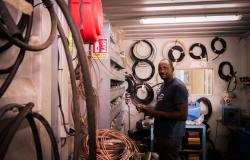During a press conference on Tuesday, September 24, at the Basse-Terre hospital center, the Union of Health Workers took stock of the health system in Guadeloupe.
The UTS-UGTG organized a press conference this Tuesday, September 24, at the Basse-Terre hospital center.
For Julien Noël, Secretary of the UTS-UGTG at the Basse-Terre Hospital Center, the 50th anniversary of the union section is an opportunity to take stock of patient care, but also of the working conditions of health personnel.
©Guadeloupe
For the union, several examples illustrate the deterioration of the health system in Guadeloupe. The Magnetic Resonance Imaging (MRI), inaugurated on April 24, 2024 at the Basse-Terre Hospital Center, is proof of this, according to them. The tool was to mark an important step in improving the provision of care in the south of Guadeloupe.
By strengthening the CHBT’s technical platform, the objective was to offer the population faster and more equal access to advanced diagnostics.
Acquired with European funds (FEDER) and the support of the Regional Authority, this technology aimed to reduce waiting times for medical examinations, promised faster emergency care and a rebalancing between public and private health provision in the region. However, the union regrets that several months after its commissioning, the use of this equipment remains limited.
This situation is mainly due to a lack of doctors and a lack of efficiency on the part of the head of this department.
UTS-UGTG press release
According to members of the Union of Health Workers, the waiting times for obtaining test results are much longer than expected, ranging from 15 days to three weeks, which limits the effectiveness of diagnosis and, consequently, of treatment.
The hospital management has tried to compensate for these delays by increasing the appointment times for MRI scans. However, this measure is considered insufficient by the UTSG, because it is not accompanied by an increase in human resources. The medical staff is overloaded, claims the section.
In addition, some MRI features would still not be available, such as breast scans.
Another argument of the UTS-UGTG, the recruitment of manipulators and specialized doctors which has also been a source of difficulties and conflicts. Three new manipulators were hired between June and August 2024, however, the UTS deplores their lack of experience with tools such as MRI or scanners. Other candidates, more qualified, would have preferred to join other establishments because of hiring conditions deemed unattractive.
This is also the case for practitioners graduated outside the European Union (PADHUE). Several interested in radiology positions at the CHBT ultimately declined, denouncing unfavorable financial conditions and a lack of administrative support upon their arrival.
For unionists, the situation at CHBT contrasts with other overseas territories, such as Martinique or Guyana, where heads of establishments are trying to make their hospitals more attractive to PADHUE practitioners. In these regions, efforts are being made, they explain, to integrate and retain these doctors.
In Guadeloupe, the question of the attractiveness of hospital positions remains a major challenge, in a context of medical desertification affecting all specialties.






